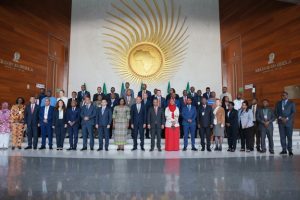
• Set to advancing social entrepreneurship
BY HAFTU GEBREZGABIHER
STEM Synergy is striving to help improve quality of education in the science, technology, engineering and mathematics (STEM) fields so that trainers can acquire practical skill in addition to the theoretical knowledge given in the general education.
STEM Synergy is a US-based non-profit organization that has been working to promote quality education, technology transfer and social enterprises that benefit youth and women through hands-on technologies and innovation that solve real problems of the society says Asegedech Shawl, the country representative of STEM during an exclusive interview with The Ethiopian Herald this week.
The main objective of STEM Synergy is to enable students acquire an hands on knowledge and creating enabling platform to enhance knowledge and skill that can alleviate the country’s challenges at large excelling at the vicinities level where the STEM centers are operating, according to STEM Synergy project manager, Abiyot Habtemariam.
“Those who are interested to pursue in the area through these platforms can invent technologies, adopt from abroad appropriately and they can produce those technologies in Ethiopia so that they can solve community problems. So, STEM is established in the sense of quality education in the areas of science and technology.”
Abiot added; STEM is working to produce STEM work forces in the country not only in developing in line with these areas; but also it has been able so far to operate 22 STEM centers in Ethiopia and transferred to be operated by the higher public institutions. Some are still in preparatory and high schools to address the problems in the students.
The country manager noted that students can be selected based on their performance because the STEM student’s centers can only accommodate few students in order to focus on quality, have a good student’s facilities ratio in terms of equipping labs in the ICT field.
Furthermore to expand developing STEM workforce, STEM is working to establish social enterprises in the country. STEMs intention is to create jobs based on solutions. Transferring technologies, creating social enterprising and give opportunities for the women and those economically powerless segments of the society, is the other goal.
STEM has been entered in to the viable and suitable technologies in the country because there is untapped potential in the sector. Recently, STEM initiated a project (solar project going to be transferred to the youth and women.
“In doing so, there limitations induced even from the global financial crisis, in terms of securing resources.”
As a solution, STEM is trying to fix the endless pitfall of depending in foreign donors. Thus, STEM is striving to engage in the business modality parallel to the charitable activities Abiot stated adding that this will increase its reach out to benefit students in terms of acquiring quality education so that it will be translated in to social enterprising.
To this end, STEM has been started fabricating solar bakery technologies to be transferred to the potential entrepreneurs. So far STEM has transferred such machines to the women beneficiaries in the Afar region in terms of long term loan taking in to account that the beneficiaries can’t pay the whole cost of the machinery (transfer cost, training cost and related). It is the form of long term loan, he added.
This will be expanded to the solar focused projects (solar energy, irrigation). These projects are earmarked and are now in the pipeline in the business angle to back the charity work.
STEM’s intervention includes innovation which focuses on a new solution and idea to improvement the life condition of the community and solving existing problems. In addition, creating an impact, sustainability, scalability, inclusion and affordability are among the major focus areas.
Abiot added that the first batch of the coding and robotics training so far has invented some projects with the objective of alleviating problems. From now on the pilot projects in the headquarters based in Addis Ababa will be replicated through expanding artificial intelligence, robotics and coding as per STEM’s vision.
Demeke Temesgen is a graduate of the Addis Ababa Science and Technology University in Mechanical Engineering parallel to his software development, robotics and coding studies from various institutions. He also studied artificial intelligence (AI) and data science. Demeke is now working with STEM Synergy as trainer of robotics and coding.
The main goal of this training is to offer practical knowledge to the trainees on how to change the theoretical knowledge of chemistry, physics and mathematics in to practical skill, Demeke says.
In the first step when people hear about robotics, there is some sort of confusion. However, after the training, students are able to acquire on how to translate it in to practical knowledge, according to the trainer. It is very interesting field; students stay for so long hours and do not want to stop doing it after they start the practice.
Samuel Werash and Nahom Solomon are both preparatory school students from the Lideta Catholic Cathedral School. “The training provided for us by STEM is helpful to get familiarized with robotics and coding subjects. I believe in my real life, it will help me to make big difference in achieving my dreams of becoming software engineer,” says Samuel.
For his part, Nahom says that they have been able to develop three projects (Vehicles controlling technology, ATM machine and traffic light) after the exposure. Nahom, asked about his dreams says “I wish to be aerospace engineer.”
THE ETHIOPIAN HERALD FRIDAY 2 SPTEMBER 2022




